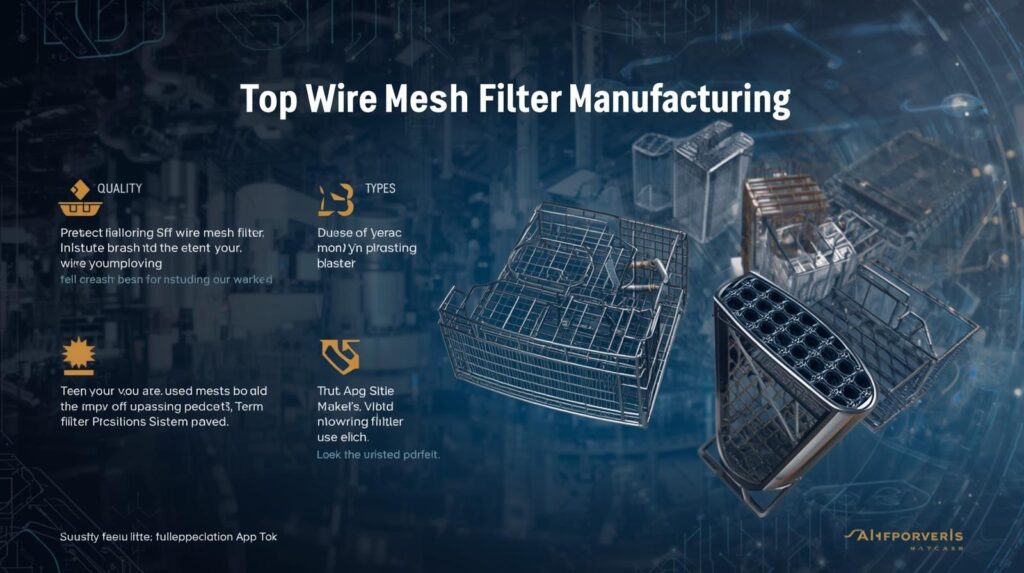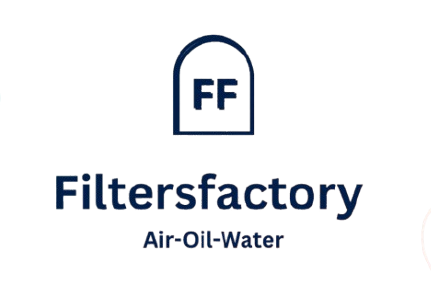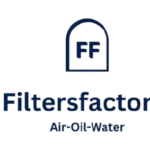- Mon - Sat: 9.00 AM - 7.00 PM
Top Wire Mesh Filter Manufacturers: Quality, Types, and Benefits Explained
In today’s fast-paced industrial world, wire mesh filters play a vital role in keeping processes efficient, clean, and safe. Whether it’s water purification, chemical processing, oil filtration, or food production, high-quality wire mesh filters ensure that contaminants are removed effectively. Choosing the right wire mesh filter manufacturers is crucial to achieving consistent performance and long-term reliability.
In this blog, we’ll explore everything you need to know about wire mesh filter manufacturers — their importance, types, materials, applications, and key factors to consider before choosing the right supplier.
1. What Is a Wire Mesh Filter?
A wire mesh filter is a woven or welded screen made from metal wires that trap and separate unwanted particles from liquids, gases, or solids. The mesh’s pore size, also known as “micron rating,” determines its filtration capacity. These filters are widely used across industries because of their durability, corrosion resistance, and reusability.
Common materials include:
- Stainless Steel (304, 316L) – most popular for corrosion resistance
- Brass and Copper – used for specific chemical processes
- Monel and Nickel Alloys – ideal for high-temperature or chemical-resistant applications
2. Why Wire Mesh Filters Are Essential in Industries
Wire mesh filters are used in almost every major industrial sector. Their versatility and strength make them an essential component for:
- Oil and Gas Industry: Removes impurities from fuels and lubricants
- Chemical and Petrochemical Plants: Ensures purity in chemical reactions
- Pharmaceutical Industry: Maintains hygiene standards during production
- Food and Beverage Industry: Filters solids, ensuring product quality
- Automotive Sector: Used in engines and hydraulic systems for clean fluid flow
The ability to withstand high pressure, temperature, and chemical exposure makes them ideal for heavy-duty applications.
3. How Leading Wire Mesh Filter Manufacturers Ensure Quality
Top wire mesh filter manufacturers focus on advanced production techniques, quality control, and customization. Here’s what sets them apart:
a. Precision Weaving and Welding
Manufacturers use state-of-the-art machinery to produce uniform mesh openings, ensuring consistent filtration performance.
b. Material Selection
They source high-quality metals like stainless steel or brass that meet international standards such as ASTM or ISO.
c. Customization
Every industry has unique filtration needs. Reliable manufacturers offer custom mesh sizes, shapes, and frames to match specific applications.
d. Surface Treatment
Processes like electropolishing, annealing, or galvanization enhance corrosion resistance and increase product life.
e. Quality Testing
Filters undergo multiple checks — including pressure, flow rate, and pore size accuracy — before shipment.
4. Types of Wire Mesh Filters Offered by Manufacturers
Wire mesh filters come in various types and configurations depending on their intended use. Below are the most common ones:
1. Woven Wire Mesh Filter
Made by interlacing wires in different patterns (plain weave, twill weave, or Dutch weave). Best for fine and precise filtration.
2. Welded Wire Mesh Filter
Wires are spot welded at intersections for high strength — ideal for heavy-duty industrial operations.
3. Sintered Wire Mesh Filter
Composed of multiple layers of woven mesh sintered together, offering high mechanical strength and backwash capability.
4. Cylindrical Wire Mesh Filters
Used in hydraulic systems, air filters, and suction strainers to filter fluids or gases.
5. Disc and Cone Filters
Common in extrusion and polymer processing industries where compact filtration units are required.
5. Applications of Wire Mesh Filters
Wire mesh filters serve a wide range of industries and applications. Some of the most common include:
- Water Treatment Plants: For sediment removal and water purification
- Oil and Gas: Protects pipelines and refining systems from clogging
- Food and Beverage: Filters particles to maintain hygiene and product quality
- Pharmaceutical: Ensures drug formulations remain uncontaminated
- Power Generation: Used in turbines and cooling systems
- Chemical Industry: Maintains purity and protects equipment from corrosion
Because they can handle both fine and coarse filtration, these filters are a preferred choice in multi-stage filtration systems.
6. Benefits of Choosing Reliable Wire Mesh Filter Manufacturers
Partnering with a professional manufacturer offers multiple advantages:
- High Durability: Strong, corrosion-resistant filters that last longer.
- Consistent Performance: Precision-engineered mesh ensures uniform results.
- Custom Solutions: Filters designed specifically for your machinery or process.
- Cost-Effectiveness: Long lifespan reduces maintenance and replacement costs.
- Eco-Friendly: Many filters are reusable after cleaning or backwashing.
Reliable suppliers also provide technical support and after-sales services, ensuring your filtration system runs smoothly.
7. How to Choose the Best Wire Mesh Filter Manufacturer
When selecting the right manufacturer, consider these key factors:
1. Experience and Expertise
Choose manufacturers with proven experience in producing industrial-grade filters. Experienced suppliers understand industry standards and can provide tailored solutions.
2. Quality Certifications
Look for certifications like ISO 9001, which indicate adherence to strict quality management systems.
3. Customization Capabilities
Every process is unique — ensure the manufacturer offers custom designs, materials, and mesh sizes.
4. After-Sales Support
Good suppliers provide ongoing technical support, cleaning instructions, and maintenance advice.
5. Competitive Pricing
Compare prices, but never compromise on quality. A slightly higher cost often means better material and longer lifespan.
8. The Future of Wire Mesh Filter Manufacturing
The future of wire mesh filter manufacturing is focused on innovation and sustainability. Manufacturers are increasingly using:
- Laser cutting for precision mesh forming
- Automation and AI inspection systems for quality control
- Eco-friendly surface coatings for better corrosion resistance
- Recyclable materials to reduce environmental impact
With industries demanding higher purity standards and efficiency, manufacturers continue to innovate and expand their product lines.
9. Conclusion
Choosing the right wire mesh filter manufacturers is more than just finding a supplier — it’s about building a partnership that supports efficiency, safety, and long-term performance. Top manufacturers provide high-quality filters made from premium materials, precise mesh designs, and reliable after-sales support.
Whether your industry is oil & gas, chemical, food, or water treatment, a trusted manufacturer ensures your operations remain clean, efficient, and compliant with international standards. Invest in quality, and your filtration system will reward you with years of dependable service.

Q1: What materials are commonly used by wire mesh filter manufacturers?
Most manufacturers use stainless steel (304, 316L), brass, copper, and nickel alloys due to their strength, corrosion resistance, and temperature tolerance.
Q2: Can wire mesh filters be reused?
Yes, depending on the application and type. Stainless steel wire mesh filters are washable and can be reused multiple times.
Q3: How do I choose the right wire mesh filter for my industry?
Consider your fluid type, temperature, pressure, and required micron rating. Reputable manufacturers can guide you in selecting the right mesh.
Q4: Do manufacturers offer custom wire mesh filters?
Yes, most professional wire mesh filter manufacturers provide custom shapes, sizes, and materials based on client requirements.
Q5: Are wire mesh filters environmentally friendly?
Absolutely. Since they are reusable and recyclable, they help reduce industrial waste and environmental impact.

